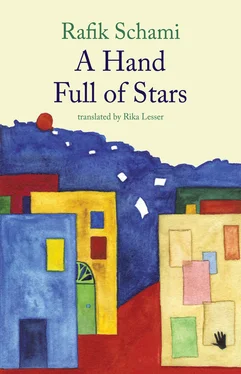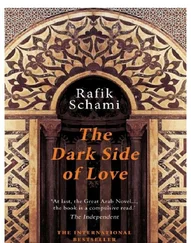When he saw the apartment, he was amazed at how neat and clean it was. “I think I should go to jail once a week,” he said, smiling.
I disappeared for two hours and went shopping. I’m no ogre! When I returned with a full shopping bag, Mariam was already gone. The bed looked as rumpled as ever. Habib had a loving smile on his face and was happy about the things I’d brought. He talked to me about prison for a long time.
Right now I’m dog tired; tomorrow I’ll write it all down.
Wednesday — What Habib had to endure those three weeks sounds like an incredibly gruesome tale. With about fifteen other men, he was locked in a cell that had room for five at most. Ten of the prisoners had to stand close together so that five at a time could take turns lying down for a few hours. It wasn’t always easy to maintain harmony among the prisoners; exhaustion made them aggressive, but after a while they were able to manage.
Habib had a very hard time. After all, he’s a member of the ruling party. In the beginning the other prisoners wouldn’t speak to him. At first they thought he was an informer and reproached him with all his party’s atrocities. This hurt Habib more than the ruthless torture that was to come.
The next three days he was left in peace and could prepare himself for the trial. This, however, was to no avail, since his interrogator did not want to hear why he had published the article, rather who had paid him to destroy the reputation of the government. Habib exonerated all his colleagues and even the editor in chief, but this, too, was pointless.
On the fifth day he was subjected to barbaric torture. He collapsed, unconscious, and awakened in the cell, where his fellow inmates had forgotten their hatred and accepted him as one of them. They gave him cigarettes that had been smuggled in and told him why they were there.
Every party, profession, and ethnic group in Syria was represented in that cell. Among them was also a madman who had been called a spy. He continually sang sad songs about his sparrow, whose murderers he sought. Things went very badly for him, and after several days he became ill. But then something happened that greatly astonished the prisoners. A sparrow came flying, perched on the little windowsill, and trilled away as if possessed. At first the prisoners wanted to drive it off, but the madman was very happy about the bird and fed it with bread crumbs from his own mouth. Every day the sparrow came flying, but on the third day the madman was so sick he had to be moved. After that the sparrow vanished. I asked Habib to describe the man — I’m sure he was my madman.
When I was leaving, Habib said to me, “In this country no one can practice journalism.” All he wants to do now is translate.
December 20 — Habib is diligently working away on his translation. He was in an excellent mood today, but when I asked again if he really wanted to give everything up because of his imprisonment, he screamed at me and tore off his shirt. Horrifying scars cover his entire chest!
“This is journalism!” he cried. I looked away. It hurt me. But he calmed down, and we laughed about the editor in chief, who now constantly apologizes on the radio and in the papers, in the hope of getting a job again.
I asked Habib if Nadia and I might come to his place once a week. He guffawed. “Once in seven days? Are you monks? You can come here seven times a day.” He winked at me and nudged me in the side. Of course I have to tell Nadia about this right away.
December 23 — Habib and I have had another fight. I can’t get it out of my head that one should be able to work as a journalist here even without the government newspaper. But Habib asked aggressively, “How then?” and I could not help myself; I screamed back, “If I had been a journalist as long as you, I would have found hundreds of ways.” But he is stubborn and continues to enjoy translating the novel. Today he reproached me, calling me an incorrigible idiot. Let him say that. It doesn’t offend me in the least.
January 11 — Today I saw the madman. They let him out of jail. He was squatting outside the Umayyad Mosque, mute as one of its stone pillars. People went by without paying him any mind, though now and then someone tossed him a coin.
I recognized him right away, even though he is greatly changed. His hair has been cut; his skin is very pale. Two round scars gleam from his temples; they look like they were burned in with two glowing metal rods. He sat entirely still. The pigeons, which enjoy special protection in the proximity of the mosque and thus fly around cooing in droves, don’t interest him at all.
I squatted down beside him and started talking to him. He looked at me with wide eyes and repeated my question, “What’s wrong with you, Uncle? What’s wrong?” He rubbed his temples with his knotty fingers and began to cry. Then he gazed into the distance and was silent.
What horrifying torture this poor man must have endured. Out of a wise man they have made a miserable bundle of flesh and bones.
January 15 — Today I had an unpleasant row with Josef. From day to day he grows more enthusiastic about the army. He plans, because he is so big and strong, to join the paratroopers and go to war. I told him a joke I’d heard from Uncle Salim, who cannot tolerate any army on earth:
A parachutist is supposed to land behind enemy lines and carry out an act of sabotage. His commanding officer explains the delicate operation and how it should be accomplished: “Since your mission is very important, we have equipped you with a double parachute. After you’ve jumped, press the green button, and the chute will open. If it doesn’t work, which seldom happens, press the red button. Then the second chute will open with one-hundred-percent certainty. When you land, you will find a motorbike leaning against a tree. Get on it and go to the rendezvous.”
The paratrooper jumps. He presses the green button several times, but the chute doesn’t open. “Okay,” he says, and pushes the red button — once, twice — but the second chute doesn’t open either. “This is not my day,” he curses. “And when I land, I bet the motorcycle will have been stolen.”
Josef didn’t find the joke about the stupid paratrooper the least bit funny. He was annoyed and said that only cowards like myself and senile Uncle Salim could tell such jokes. That hurt me a lot.
January 20 — How can one publish a newspaper without the government banning it? Lots of underground parties print their own newspapers and then pass them from hand to hand. I’ve gotten copies of two such newspapers from acquaintances. They were one big yawn. Is it worth endangering your life for such imbecilic drivel? No!
Habib has left the ruling party. I share his happiness. Mariam and I had tea at his place. Eighteen years he was in the underground and suffered every disgrace because of his party. Once it came into power, he couldn’t remain in it for even two years.
January 27 — We wanted to see another skin-flick. Mahmud arranged to get the tickets. This time I specifically wanted to seek out my math teacher and say hello to him, but he wasn’t there, or at least I didn’t see him.
Shortly before the film began, a man got up on the stage and loudly announced, “Unfortunately, we cannot show the film. The new chief of police has found out about it, and in half an hour he will send in plainclothes-men. If he catches us, he’ll have the theater closed.”
The lights went down, and suddenly a kitschy, schmaltzy film came on. The entire theater went wild, and somebody began to tear up the fine cloth of the lovely seats. Soon others started to jump up and rampage. Even Mahmud got out his pocket knife and slit the upholstery.
Читать дальше












